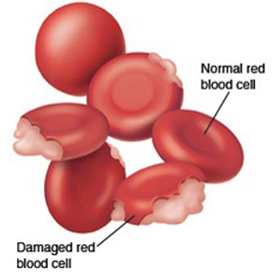
Individuals with G6PD deficiency usually show no signs or symptoms of the condition until they are exposed to certain medications, foods or infections. These exposures can trigger the red blood cells, which carry oxygen around the body, to break down prematurely. This early destruction of red blood cells is called hemolysis. If these cells break down more quickly than the body can replace them, it can lead to excess tiredness, shortness of breath, and rapid heart rate. In severe cases, it can even lead to kidney failure or death.
When the condition is identified through newborn screening and properly managed, children with G6PD deficiency often can lead healthy lives.
